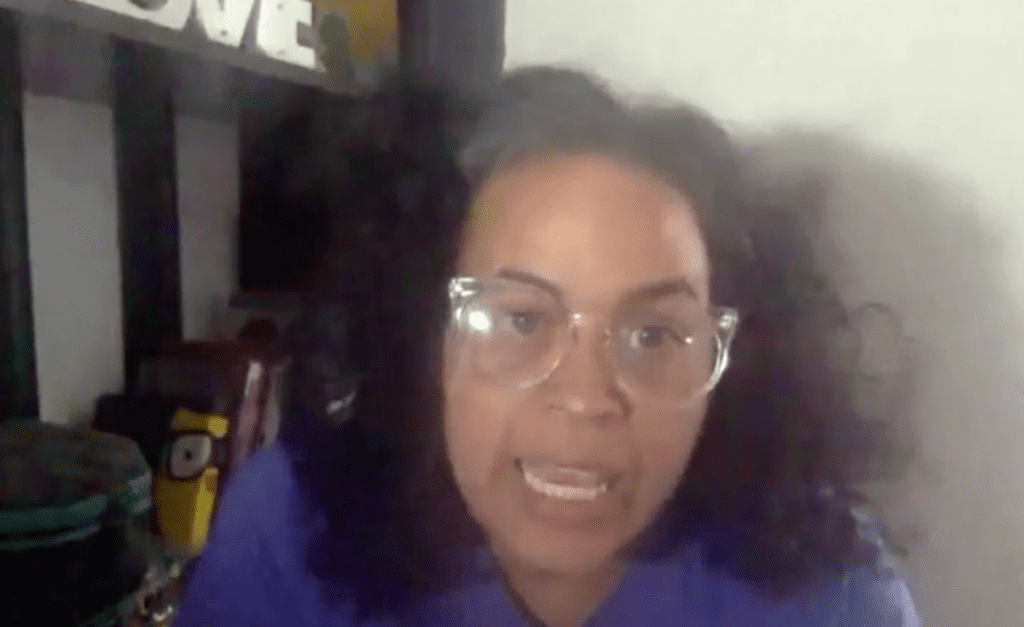‘Cultural Humility’ = Wokeness At Baylor

I’ve just watched a 90-minute recorded Zoom call among a bunch of Baylor University faculty and staff. Here’s what it was titled:

“NSE” means New Student Experience. It’s a program at the university to help new students transition to life on campus. Or, in Baylor’s words:

Is this about learning how to study, show up for class, prepare for tests, and so forth? “Academic Rigor” is only one of the areas they focus on at NSE. Here are the others:

How common are things like this in college today? I went to a big state school in the 1980s. The approach to “new student experience” was simple: Throw you in, you sink or swim on your own. You are an adult. The university did not feel the need to coddle freshmen. College was much cheaper back then. I cannot help believing that there is a connection between the cost of college today (at Baylor, it’s over $60,000 per year) and the therapeutic bureaucracies.
Anyway, the panel discussion I watched was about cultural humility. “Cultural humility” is an interesting phrase. It seems to be conceived as an antonym for “cultural arrogance,” but having listened to this discussion, it seems rather to be a program of destroying cultural confidence. I can’t link to it — it’s behind a university firewall — but the whole thing is pretty discouraging. I cannot imagine being a student or faculty member and having to study or teach under the neuroses this mentality surely induce.
One of the panelists was Kerri Fisher from the social work school. You might remember her from my recent “Woking Up At Baylor” post. The university’s president had recommended a list of readings about racism suggested by Prof. Fisher. If you follow that link, you’ll see that it’s all radical left stuff. At this Texas Baptist university, the president did not think of consulting someone at the theology school for Christian resources on thinking about racism. Nor did she consult Prof. George Yancey, a black sociology professor who is a devout conservative Baptist, and who has been published on the subject of race and social conflict by Oxford University Press, and on how to get “beyond racial gridlock” by IVP. Instead, she highlighted a social work professor who recommended the same woke ideology that you can get at any secular university. I wonder why.
Anyway, the 90-minute seminar offered no big “gotcha” moments, but it was, for me, a useful glimpse into the left-wing therapeutic mentality of university life. I don’t know to what extent this stuff is completely par for the course at most secular universities. It is hard, though, to see how a university that claims to be proud of its Christian identity reconciles it with the ideology behind its idea of “cultural humility.”
Here’s what I mean. At around the 36 minute mark, Kerri Fisher discusses “cultural humility fouls.” She says, for example, that normative language is problematic. If students hear their teachers saying that some things are better than others, “then our students are seeing that we actually do have a hierarchy of who we think is right, and good, and pure, and all of those sorts of things.”
She doesn’t really explain that, and let’s leave aside that she couldn’t possibly believe the radical relativism implied in her line. It would make education impossible. What interests me is how you can institute that kind of radical relativism into classrooms at a Christian university, where Christianity is supposed to be normative? Why would you want to, if you still wanted your university to be distinctly Christian? You can’t do it. If professors are not supposed to teach as if Christianity is normative, then what is the point of having a Christian university? If students want a secular education, they could just go to state school, or maybe Loyola of Maryland.
On one of its NSE web pages, Baylor says that students who go through the program:

How are professors and staff expected to do this if they are also being taught that “cultural humility” means that they cannot assert that there are any norms? Why is Baylor working at cross purposes with its supposed mission of Christian formation?
Around the 52 minute mark, Sharyl Loeung of the Office of Multicultural Affairs shares a practice she follows on the first day of each class:
“I always let my students know up front, hey, look, I’m a white female that’s cisgendered, heterosexual — I’m married — these are the privileges I know I have. … It’s not an apology, it’s just that I want to let you know that I see myself — we’re all racialized in some way, it’s just how the world is.”
Loeung says that “it really seems to cut through the tension in class.” Oh? If I were any of those demographic groups, I would worry that the professor would mark me out as privileged, and I would be afraid to speak. Are these people sure they’re teaching cultural humility to these students — or are they teaching them cultural shame?
At the 53 minute mark, an other professor — I didn’t catch her name, but I think she’s Latina — says that it’s important to help students “get past” their “white guilt” because “we need advocates.” She says, “This is not just people of color work.” Students should feel “empowered,” not worried that they will make mistakes.
Advocates for what? Hang on, that’s coming.
At the 1:05 mark, Kerri Fisher encourages her fellow teachers to ask students for their pronouns. “Preferred pronouns is another way to show some inclusive leanings,” she said. So Baylor is normalizing gender fluidity in its classroom practices. Won’t that be interesting for the donors to learn.
Later comes a query asking the best way to handle “active and vocalized resistance to conversations about race and identity in the classroom?”
A black male professor whose name I didn’t catch said something insightful. He suggested that one reason for their resistance could be that “they want to be able to go home.” That is, they don’t want to be made to feel that the have been alienated from their families or their home churches by what they learn at Baylor about race and identity. The man said that Baylor shouldn’t make them feel that they can’t go home.
Sharyl Loeung adds that it’s difficult not to dismiss the person who is resisting.
There’s nothing really wrong with this discussion, but it strikes me as remarkable that they have bene talking for an hour about the importance of making students conscious of race and identity in the classroom, then come up with ways to manage the passions that come out of it.
“We want to really be careful for those students who will be most harmed in the room,” said Leoung. “I think we think about the equality of the voices — like everyone being heard, versus the equity in the room, who’s really being heard.”
The equality-equity question. In wokespeak, “equality” is giving everyone an equal chance; “equity” is doing the things necessary to make sure there has been an equal outcome. I’m not sure what that means in terms of managing a classroom discussion. Choosing those from officially non-privileged demographics to speak first?
One professor talks about the difficulty of telling students that we have to talk about identity (“Our identities matter”). This made me think about how much I appreciated that at LSU in the Eighties, nobody asked you about your identity. You just talked about the classwork. Talk about identity in the hall, on the quad, at the bar. Big deal. I sincerely don’t understand the point of this.
That professor invites his colleagues to visit the Dear Baylor Instagram account, where BIPOC graduates of Baylor anonymously list macroaggressions and microaggressions they endured at Baylor.
I did spend some time there after watching the panel. Some of the stuff that Baylor alumni report were serious and appalling. But some of this stuff is silly. A Vietnamese student complains that people at Starbucks and Chili’s didn’t want to hear her spell out her last name when she ordered. She also complained that people wished her Happy Chinese New Year, when she is not Chinese. A Muslim from Birmingham, Alabama was thunderstruck when a white professor, reading aloud from Dr. Martin Luther King’s famous Letter From Birmingham Jail, and used the N-word — which is in the text. This shook her to her core. One Mexican-American student complained about a white “close friend” who said it would be nice to live in the antebellum times because it would have been fun to wear gowns all the time. The Mexican-American student spoke of the “racist abundance” in the hearts of white students.
Are students really so fragile? Are they really so eager to take offense? Are they encouraged to think that way by the university’s approach? I’m asking genuinely. If the cultural humility training and practice is like what I saw on that panel video, it would make me nervous as hell trying not to cause someone grievance.
I thought again about the question concerning how to handle students who resist their formation in this way of thinking when I saw parts of this publication. It seems clear that “cultural humility” is how you package wokeness to sell it to Evangelicals. Take a look at these pages that guide cultural humility work, and recognize the particular ideology at work here. A lot of this is contestable at the level of ideas, but it seemed to me, listening to those Baylor profs and admins talking, that they believe resistance to these concepts is the same thing as not wanting to talk about race and identity.
I guess it’s not possible for Baylor to develop an authentically Christian approach to cultural humility, and instead to rely on importing categories from culturally Marxist Critical Race Theory into the university, and dressing them up in terms that won’t frighten people. “Cultural humility” sounds like it intends to destabilize the cultural confidence that people the woke judge as Oppressors bring to school their freshman year, and to orient them towards conforming to self-loathing. Remember the professor who said that they need students to be “advocates.” Advocates for what?
UPDATE: I have taken down those photos at the request of a source.
UPDATE.2: A Baylor student who has been trained as a “community leader” (Baylor’s version of an RA) writes to say he appreciates this piece:
Part of the job requirement of being a Community Leader is to host two Cultural Humility events each year, as well as take a mandatory class that has a 5 week unit on Cultural Humility. My worldview is inexplicably Christian, and because of this, I know the most robust understanding of diversity is at the table of God. Yet, that does not matter. It is not CRT [Critical Race Theory], it is not intersectionality, it is not “woke.” Thus, my perspective is unwelcome because I have not capitulated to current culture.
We have issues at Baylor. There are horrendous stories of pernicious, racist sentiments expressed towards students of minority ethnicities and cultures. But the perceived “solutions” achieve nothing. They are not Biblical, they are superficial, and they are ultimately inconsequential. My closeted theologically conservative friends and I have talked on numerous occasions how we desperately need change; my hope is this piece gets the ball rolling. …
The class is a unique experience. From the books we read (authors such as Bonhoeffer, Nouwen, Benjamin Watson, etc.) it is rather inconspicuous. Most of the information is status quo, how to plan events, conflict mediation, and other necessary tools. But, the cultural humility unit is where most things begin to pick up steam. It first begins how to respect other cultures. This is fair. Baylor has a large international student population and being respectful, as well as willing to learn and enjoy other cultures, is important. Then, it progresses into CRT, and more specifically, intersectionality. We read and had “dialogue,” but nobody was allowed to disagree. Several people in the cohort who did publicly disagree were pulled aside after class and talked to. This was a typical pattern and as long as you used buzz words like “white privilege,” “equity,” or “tolerance” you navigated the section rather unscathed with an A in the class. Semesterly training also consisted of whole sections as refreshers on this topic, as well as breakouts focusing on the subject, one being called “White and Woke, now what?”.
For my events on Cultural Humility, I would try to use materials from people such as Dr. Charlie Dates or Afsheen Ziafat, but at one point these people did not go “far enough.” What that means, I am still unsure.
We can trace a clear and historical line from CRT to Marxism. This is absolutely apparent. Not only is Marxist ideology antithetical to a Christian worldview, it is entirely incongruent to any Abrahamic faith. Yet, this is not an issue in residential life. When CRT and biblical perspectives often oppose each other, CRT wins every time among the people in residential life. I have seen arduous attempts of text contortion to try to biblically justify underlying marxist ideology. To bring my own perspectives to events or staff meeting was met with hostility. Biblical perspectives were unwelcome and anachronistic to the current culture. Even when attempting to drill down on why diversity is important, it was apparent there was no understanding of human dignity or Imago Dei. Everything was based on what culture was screaming, not what sound minds are thinking. The residential life department is looking for a diversity of ethnicity, but not a diversity of thought.
Prof. Perry Glanzer from Baylor writes (and consents to let me use his name):
I read your post about Baylor today and was intrigued, since as a Christian I see cultural humility as something rooted in Christian theology that we should support. We are all made in God’s image, but we are all sinful and our sinfulness infects all of our cultures. All of our identity cultures have problems. Furthermore, those identity groups in power need to be especially aware of how this sinfulness creates injustices against those who are in the minority identity group. We must confess and repent of our cultural arrogance at times and follow the humble way of Jesus outlined in Philippians 2. In other words, based on theological reasons I strongly support Baylor’s initiative to develop cultural humility in students.
What deeply disturbed me; however, is what I found when I examined the means Baylor is using to achieve this important end. When I looked at the lesson plans, videos as well as the objectives listed, there is not a bit of overt theological or Christian perspective in them. In other words, instead of drawing upon the theological concepts and Christian tradition I mentioned earlier, as well as Christian practices like confession/repentance to God/others, forgiveness, etc. the whole approach is no different than something you would find at the University of Texas. As a result, students are not given Christian reasons why they should learn to demonstrate cultural humility. The Baylor staff and faculty creating this education either did not know how to think theologically or Christianly about the subject of cultural humility or they walled off their Christian thinking selves when creating these exercises. The whole approach may be inclusive of nonChristians, but it certainly is not high quality Christian education.
In this regard, Baylor is failing as a Christian university, although it is doing an excellent job of imitating their secular counterparts (and most of what I found in the Baylor lesson plans is borrowed from critical theory type professors at secular universities). Overall, these kinds of examples increasingly convince me that Baylor is becoming a “sound and fury” Christian university. There is plenty of administrative rhetoric about the Christian mission but with administrative initiatives at the faculty and staff level it seems to mean nothing.
Subscribe for as little as $5/mo to start commenting on Rod’s blog.